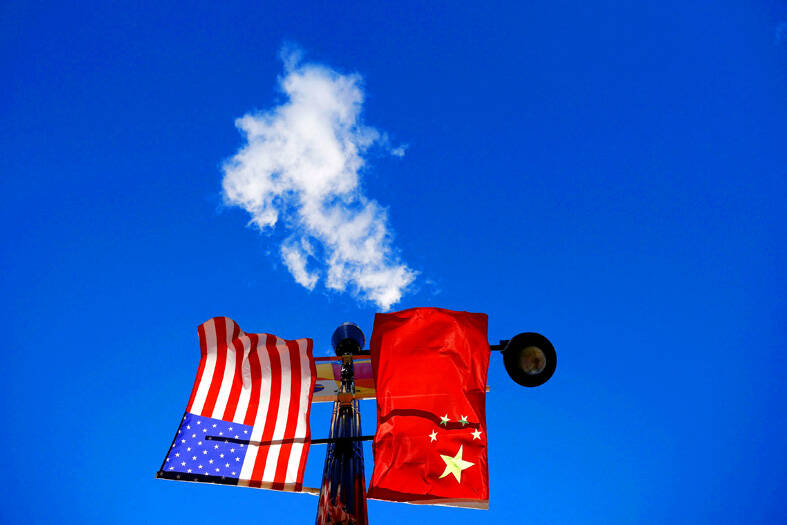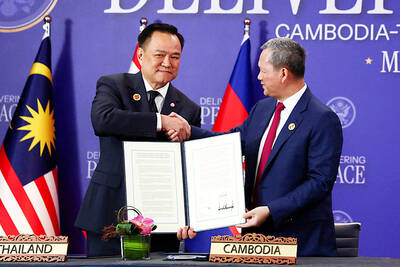The US Department of State on Friday launched its long-planned “China House” unit, an internal reorganization to help expand and sharpen its policymaking toward its top geopolitical rival.
US Secretary of State Antony Blinken in May announced the creation of China House, calling it a department-wide, integrated team that would coordinate and implement US policy across issues and regions.
“The scale and the scope of the challenge posed by the People’s Republic of China will test American diplomacy like nothing we’ve seen before,” Blinken said in May.

Photo: Reuters
Blinken on Friday presided over the official opening of the unit, formally called the Office of China Coordination, adding that it would ensure that the US is able to “responsibly manage” competition with Beijing, a department statement said.
China House is to bring together China experts from throughout the department to coordinate with “every regional bureau and experts in international security, economics, technology, multilateral diplomacy and strategic communications,” the statement quoted Blinken as saying.
It is to replace the department’s “China desk,” but would continue to be overseen by US Deputy Assistant Secretary of State for China, Taiwan and Mongolia Rick Waters in the Bureau of East Asia and Pacific Affairs, an official said.
China House would be funded out of the existing department budget, and involve additional staff joining as liaisons, embeds and for specific assignments, a State Department spokesman said.
US President Joe Biden’s administration has laid out a strategy to compete with China focused on investing in US competitiveness and aligning with allies and partners.
The two countries have worked to steady relations rocked by a series of recent US moves to expand export controls on strategic technology, such as semiconductors, and an August visit to Taiwan by US House of Representatives Speaker Nancy Pelosi, to which Beijing responded with large-scale military drills.
Biden and Chinese President Xi Jinping (習近平) met in person on the Indonesian island of Bali earlier last month, and the countries have agreed to follow-up discussions, including a planned visit to China by Blinken early next year.
Biden and Xi in Bali agreed to chart a less volatile path forward in US-China ties, which had nosedived following Pelosi’s Taiwan visit.
The US is rolling out a series of export curbs and restrictions on China’s semiconductor industry, which have led China to file a complaint at the WTO.
The bureaucratic reshuffle follows a similar decision by the CIA to create a China Mission Center in October last year.
That center was meant to strengthen work “on the most important geopolitical threat we face in the 21st century, an increasingly adversarial Chinese government,” CIA Director Bill Burns said at the time.
Additional reporting by Bloomberg

Shamans in Peru on Monday gathered for an annual New Year’s ritual where they made predictions for the year to come, including illness for US President Donald Trump and the downfall of Venezuelan President Nicolas Maduro. “The United States should prepare itself because Donald Trump will fall seriously ill,” Juan de Dios Garcia proclaimed as he gathered with other shamans on a beach in southern Lima, dressed in traditional Andean ponchos and headdresses, and sprinkling flowers on the sand. The shamans carried large posters of world leaders, over which they crossed swords and burned incense, some of which they stomped on. In this

‘NO COUNTRY BUMPKIN’: The judge rejected arguments that former prime minister Najib Razak was an unwitting victim, saying Najib took steps to protect his position Imprisoned former Malaysian prime minister Najib Razak was yesterday convicted, following a corruption trial tied to multibillion-dollar looting of the 1Malaysia Development Berhad (1MDB) state investment fund. The nation’s high court found Najib, 72, guilty on four counts of abuse of power and 21 charges of money laundering related to more than US$700 million channeled into his personal bank accounts from the 1MDB fund. Najib denied any wrongdoing, and maintained the funds were a political donation from Saudi Arabia and that he had been misled by rogue financiers led by businessman Low Taek Jho. Low, thought to be the scandal’s mastermind, remains

Near the entrance to the Panama Canal, a monument to China’s contributions to the interoceanic waterway was torn down on Saturday night by order of local authorities. The move comes as US President Donald Trump has made threats in the past few months to retake control of the canal, claiming Beijing has too much influence in its operations. In a surprising move that has been criticized by leaders in Panama and China, the mayor’s office of the locality of Arraijan ordered the demolition of the monument built in 2004 to symbolize friendship between the countries. The mayor’s office said in

FIGHTING CONTINUES: Thai military dropped 40 bombs on border areas, Cambodia said, while Bangkok said Phnom Penh launched heavy attacks and damaged homes Cambodia yesterday accused Thailand of intensifying its bombardment of disputed border areas, even as officials from the two countries attend a multi-day meeting aimed at negotiating an end to deadly clashes. The neighbors’ long-standing border conflict reignited this month, shattering an earlier truce and killing more than 40 people, according to official counts. About 1 million people have also been displaced. Cambodian and Thai officials were in their third day of talks at a border checkpoint, with ministers of defense from the two countries scheduled to meet today. However, the Cambodian Ministry of National Defense said Thailand’s military carried out a heavy